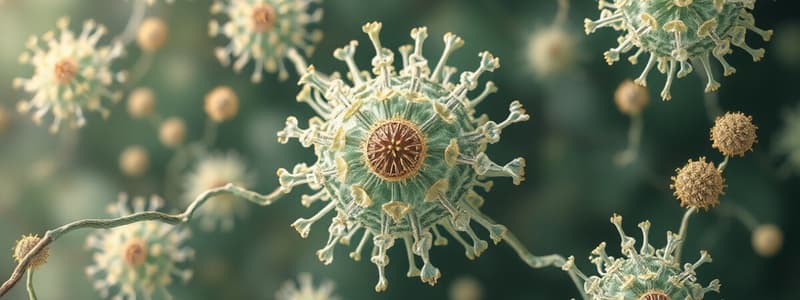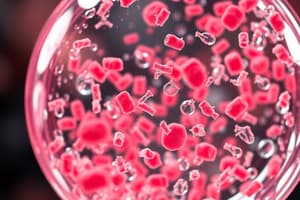Podcast
Questions and Answers
Which subfield of microbiology specifically studies fungi?
Which subfield of microbiology specifically studies fungi?
- Mycology (correct)
- Parasitology
- Protozoology
- Bacteriology
What did Francisco Redi's experiments demonstrate about spontaneous generation?
What did Francisco Redi's experiments demonstrate about spontaneous generation?
- Life can arise spontaneously in sterile environments.
- Decaying meat is the source of fly larvae. (correct)
- Microorganisms can thrive in sterile conditions.
- Oxygen is necessary for life to arise spontaneously.
What is the primary assertion of the cell theory?
What is the primary assertion of the cell theory?
- Cells arise from spontaneous generation.
- Cells can be created in the laboratory.
- All cells only come from existing cells. (correct)
- All cells are identical.
Which of the following individuals is credited with identifying the necessity of handwashing to reduce mortality rates during childbirth?
Which of the following individuals is credited with identifying the necessity of handwashing to reduce mortality rates during childbirth?
How did John Snow determine the cause of the cholera outbreak in 1848?
How did John Snow determine the cause of the cholera outbreak in 1848?
What was Joseph Lister's primary contribution to surgical practice?
What was Joseph Lister's primary contribution to surgical practice?
Which statement best describes one of Koch's postulates?
Which statement best describes one of Koch's postulates?
Which of the following is an exception to Koch's postulates?
Which of the following is an exception to Koch's postulates?
What modern focus does the germ theory of disease encompass?
What modern focus does the germ theory of disease encompass?
Flashcards are hidden until you start studying
Study Notes
Subfields of Microbiology
- Bacteriology: Study of bacteria.
- Mycology: Study of fungi.
- Protozoology: Study of protozoa.
- Parasitology: Study of helminths and other parasites.
- Virology: Study of viruses.
- Immunology: Study of the immune system.
Abiogenesis and Experiments
- Abiogenesis: Theory that life can spontaneously arise from non-living matter.
- Francisco Redi's Experiment: Showed that decaying meat did not produce maggots, indicating that flies (not spontaneous generation) were the source of the larvae.
- Louis Pasteur's Experiment: Demonstrated that sterile broth remains free of microorganisms unless exposed to air, disproving abiogenesis.
Cell Theory
- Cell Theory: States that all cells arise from pre-existing cells.
Robert Hooke's Discovery
- Hooke's Observation: Identified and named "cells" when observing cork through a microscope.
Germ Theory
- Germ Theory: Proposes that diseases may be caused by microbial infections.
Ignaz Semmelweis
- Semmelweis's Key Finding: Advocated for handwashing with lime solutions to significantly lower mortality rates during childbirth.
John Snow's Cholera Investigation
- Cholera Outbreak Investigation: Mapped cholera cases to identify a contaminated water pump as the source of the outbreak in 1848.
Joseph Lister's Surgical Advancements
- Lister's Solution: Introduced carbolic acid for sanitizing surgical wounds to prevent postoperative infections.
Florence Nightingale's Contributions
- Nightingale's Epidemiological Work: Used statistical analysis to highlight preventable causes of death related to infections, sanitation, and hygiene.
Koch's Postulates
- Koch’s First Postulate: The microbe must be found in all diseased individuals.
- Koch’s Second Postulate: The microbe must be cultured outside the host.
- Koch’s Third Postulate: The cultured microbe must cause disease when introduced to a healthy host.
- Koch’s Fourth Postulate: The microbe must be re-isolated from the diseased host.
Exceptions to Koch's Postulates
- Isolation Challenges: Some microbes cannot be cultured outside their natural host.
- Multiple Disease Causes: Some pathogens are capable of causing multiple diseases.
- Host Specificity: Some pathogens may only cause disease in specific hosts.
Modern Focus of Germ Theory
- Antibody Resistance: Researching how pathogens resist immune responses.
- Emerging Diseases: Investigating new diseases and those caused by multiple organisms.
- Mechanisms of Pathogenesis: Understanding the mechanisms by which microbial agents cause disease.
Studying That Suits You
Use AI to generate personalized quizzes and flashcards to suit your learning preferences.




